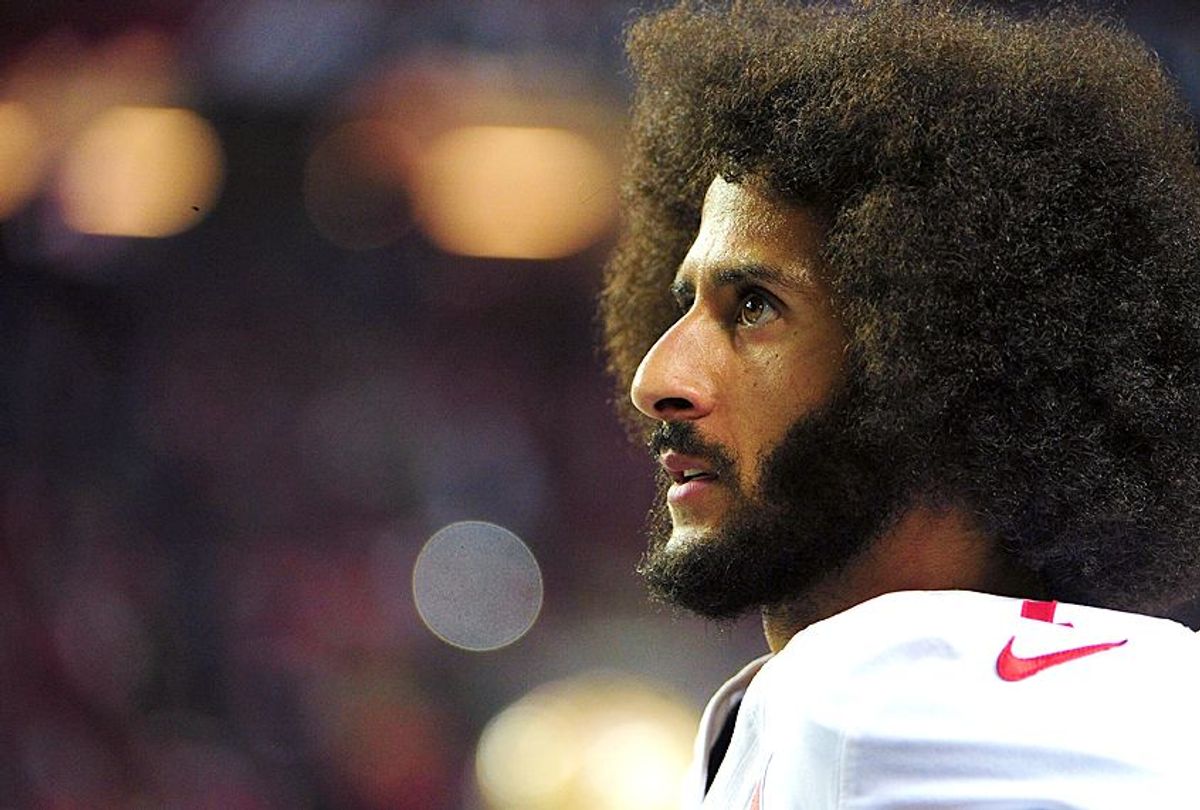Quarterback Colin Kaepernick — the player who began the still-ongoing series NFL protests against police brutality and racial injustice held during pre-game singings of the national anthem — has remained unemployed since the end of the 2016 season. Now, his legal representatives say he has filed a grievance against NFL owners for colluding to keep him out of the league.
Attorney Mark J. Geragos confirmed that he was handling the claim in a statement and said, they filed the grievance "only after pursuing every possible avenue with all NFL teams and their executives." The NFL Players Association said they will support Kaepernick's claim.
Kaepernick and Geragos are petitioning owners under the Collective Bargaining Agreement (CBA). The statement continued:
If the NFL (as well as all professional sports leagues) is to remain a meritocracy, then principled and peaceful political protests — which the owners themselves made great theater imitating weeks ago — should not be punished and athletes should not be denied employment based on partisan political provocation by the Executive Branch of our government. Such a precedent threatens all patriotic Americans and harkens back to our darkest days as a nation. Protecting all athletes from such collusive conduct is what compelled Mr. Kaepernick to file his grievance.
Kaepernick's claim, though it certainly feels true, would be enormously hard to prove in court. While the CBA does outline that it is illegal for owners and teams to conspire about or against signing a player, as the Washington Post writes, "the CBA also says the mere fact that a player is unsigned and evidence about the player’s qualifications to be on an NFL roster do not constitute proof of collusion."
Essentially, there needs to be concrete evidence of collusion or agreement between teams for such a claim to hold weight. Given that any such true, concerted collusion would likely have happened via a series of private emails or phone calls, that evidence may never come. Should Kaepernick's exclusion be the result of an unspoken agreement between owners, which is just as likely the case, there would be no evidence whatsoever.
Despite being a remarkable quarterback, many people believe that Kaepernick is jobless because of his political protests and leanings. He led the San Francisco 49ers to a Super Bowl and two NFC Championship games. Yet, after a series of personal and time-wide on-the-field failures, but he became a free agent at the end of last season after opting out of his contract — a move prompted by the team's decision to release him had he not.
Several teams considered hiring Kaepernick this season. None followed through, even those who passed him over for inarguably inferior quarterbacks. Note that there was a short burst of ultimately false rumors that that new quarterback gap on the Green Bay Packers following Aaron Rogers' injury would have been filled by the retired, injured and fully expended Tony Romo. That his name bubbled up is as much an expression of lack of industry-wide talent at the position as anything else.
Battles over taking a knee have prompted another legal complaint after Dallas Cowboys owner Jerry Jones said he would bench players who protested. A local union filed on behalf of the players, and with Roger Goodell already backtracking on taking a hard line on anthem protests, it seems the complaint, and NFL players retaining the right to protest, has a good chance of being victorious.
While Kaepernick's original protest has been amplified by players across the NFL and stolen by owners trying to de-radicalize it, often feels as if Kaepernick himself keeps getting robbed. Kaepernick took a knee alone, he boldly endured the intense criticism by himself. Following that, he's been dealing with the possible end of his career without much support beyond good words from his fans and fellow players. So even as they uphold his legacy and the causes he championed, Kaepernick remains a casualty.
It is a trope familiar to black activists in this country. Malcolm X was pushed out from the Nation of Islam Angela Davis' was terminated from her university post. Muhammad Ali was — for a time — expelled from the boxing world. Those who take radical stances for black liberation are often forced to sacrifice their careers because of it, and sometimes, even their lives.
Reverence for such political feats usually comes only after the turmoil eases, when the protests become palatable, and often when the brave figures are no longer around to enjoy the praise or progress.
And this is were we can come back to Kaepernick and his Hail Mary lawsuit. It may very well be the case that Kaepernick, a shrewd man, know that it is close to impossible that he would win. Indeed, it's not unfair to guess that he may be filing such a hopeless suit exactly because it is hopeless. Running against a wall in full view of the public may give him a shot at further showing how deeply compromised the system is, how entrenched the NFL and our nation is in upholding the supremacy. After all, it is why he took a knee in the first place.
But as the debate over NFL protests rages on, and black athletes show fervency in fighting for their humanity and communities, the entire arena of football is being transformed. Kaepernick very well may have a statue in his honor 40 years from now, which would be great. It would also do nothing to help him regain the career he loved and was taken from him.



Shares